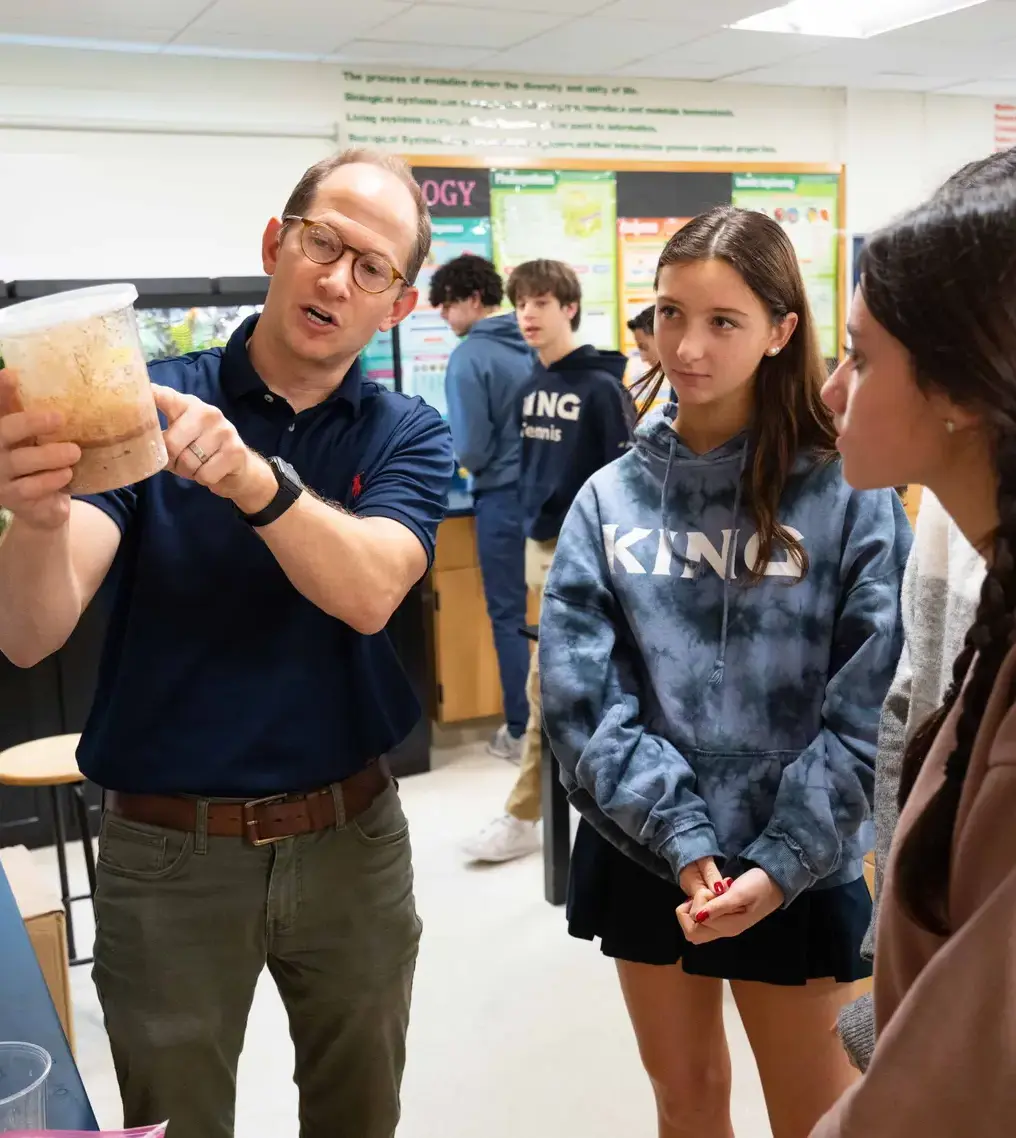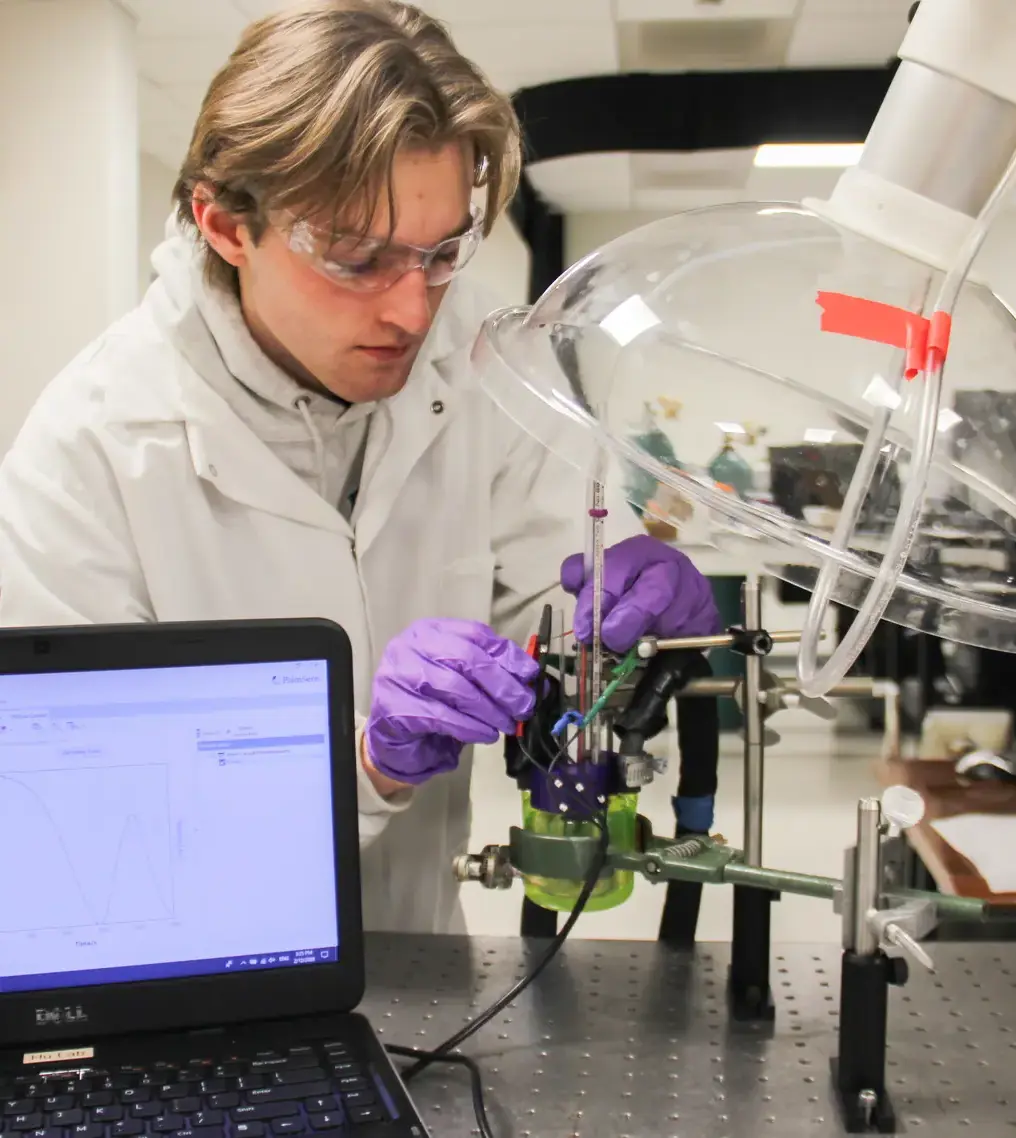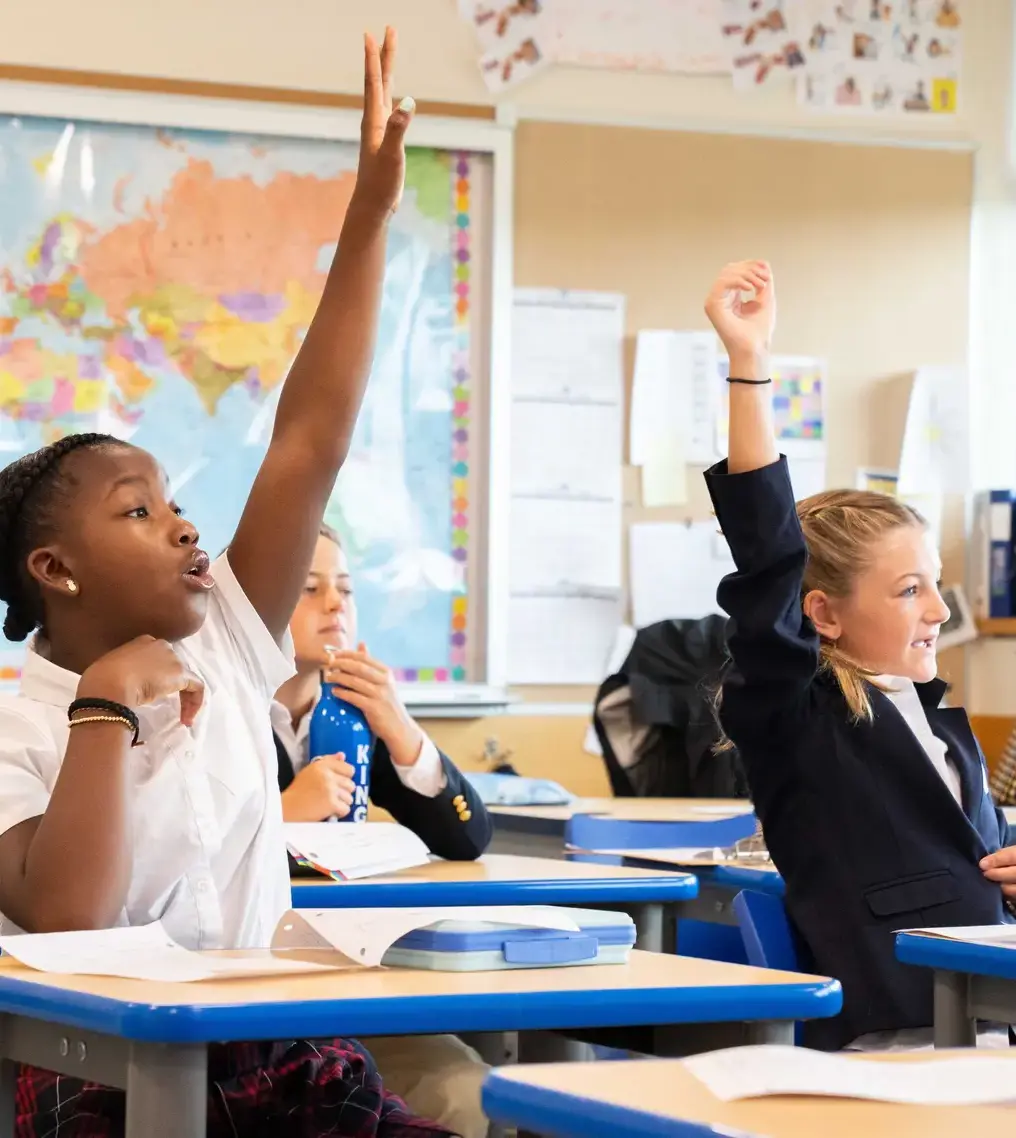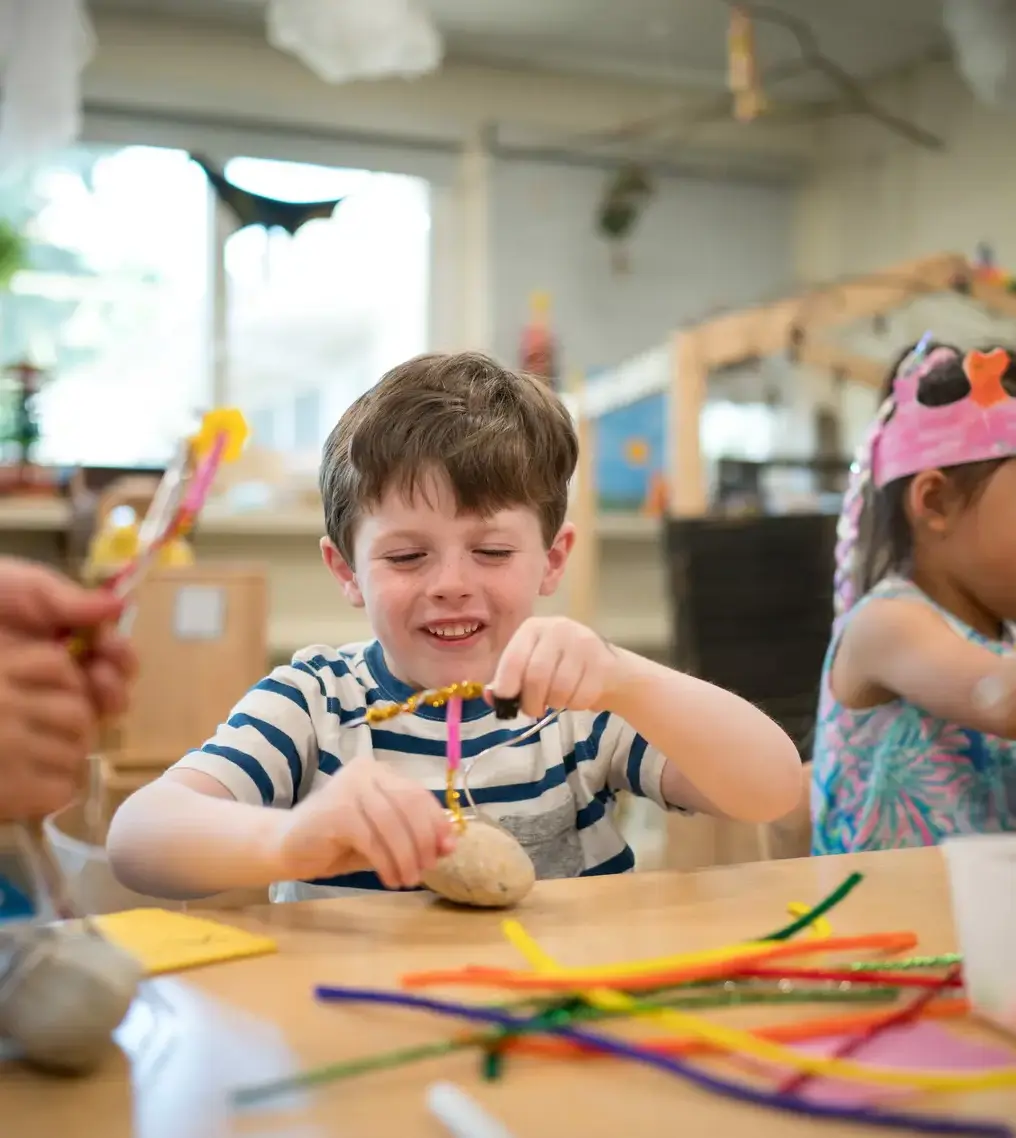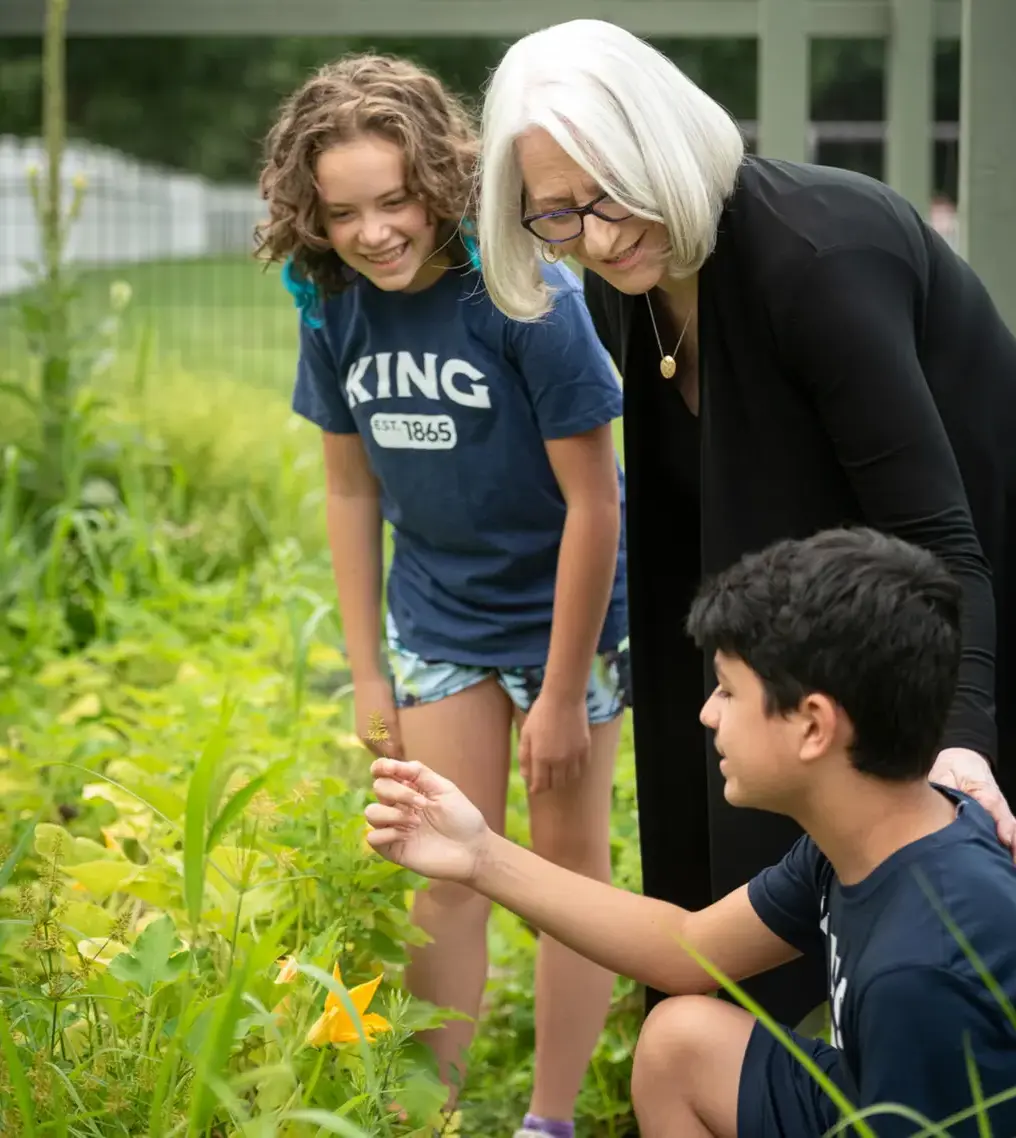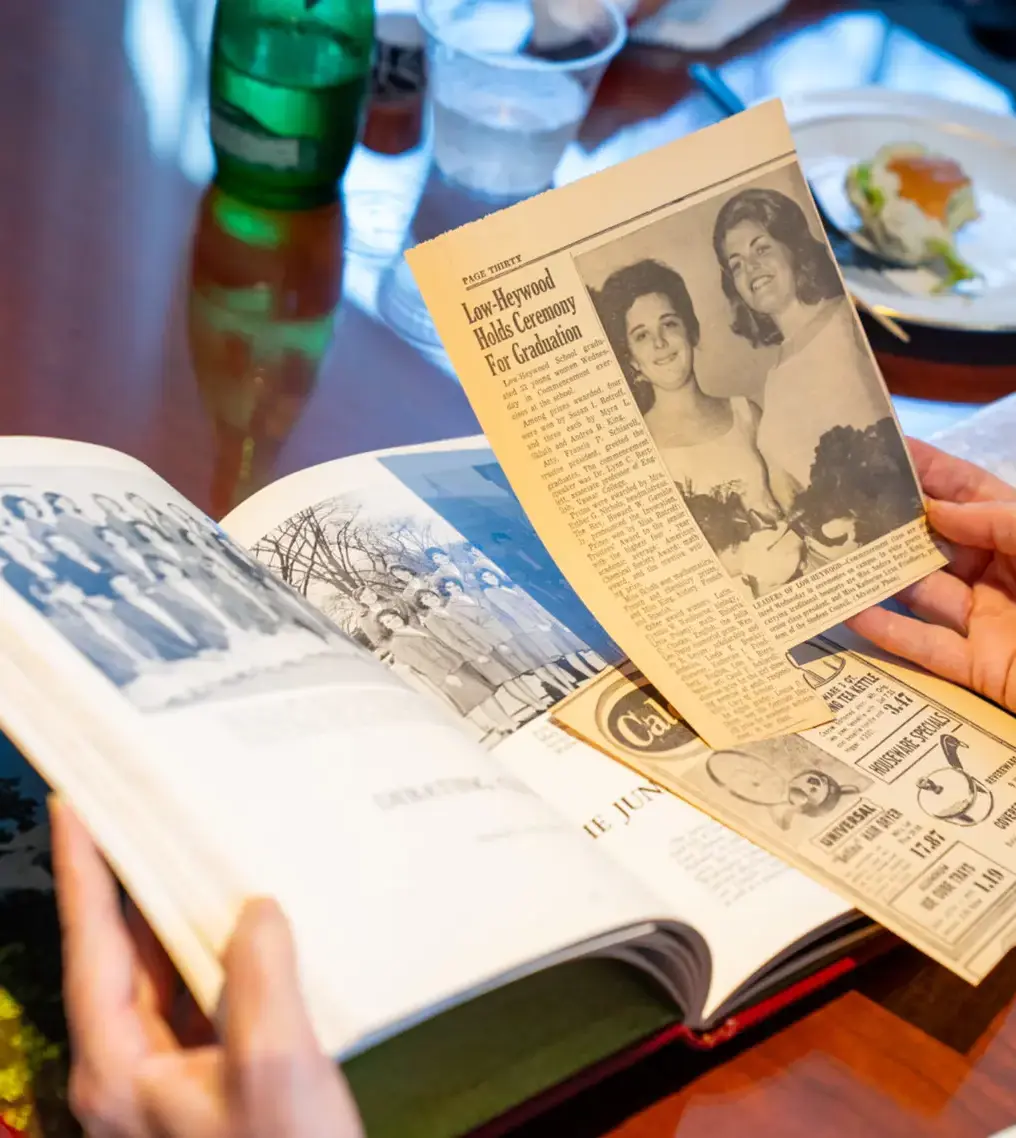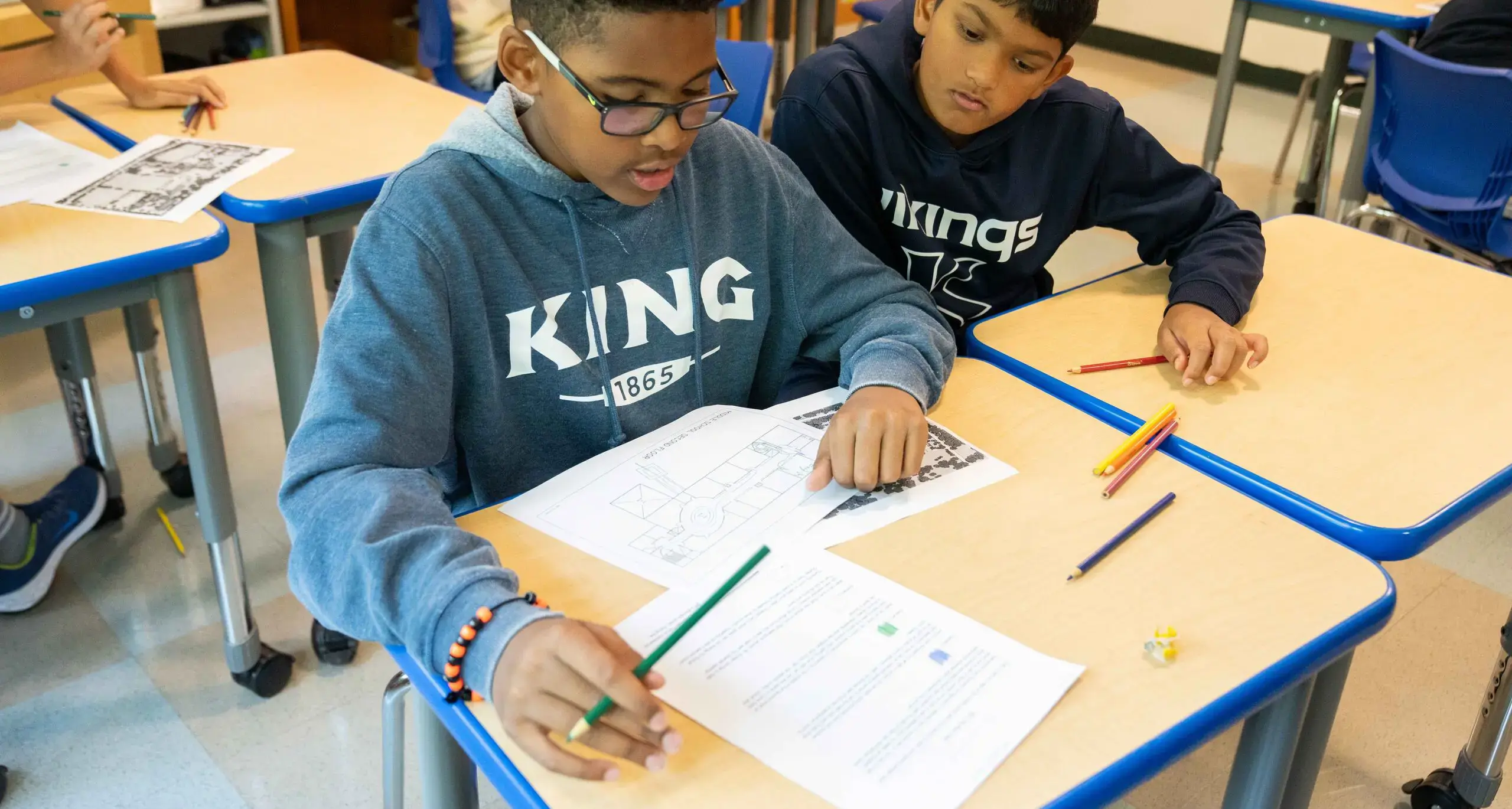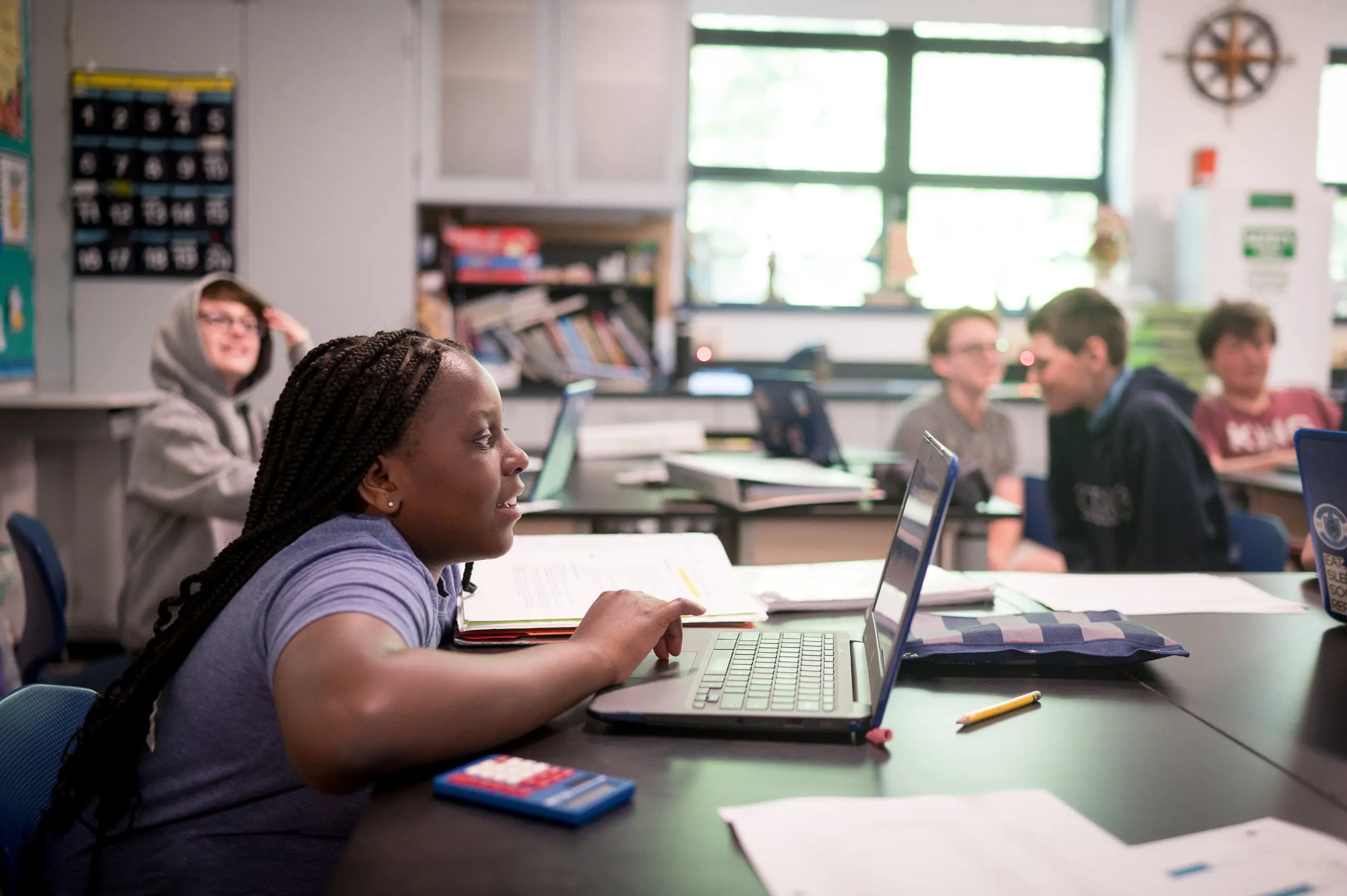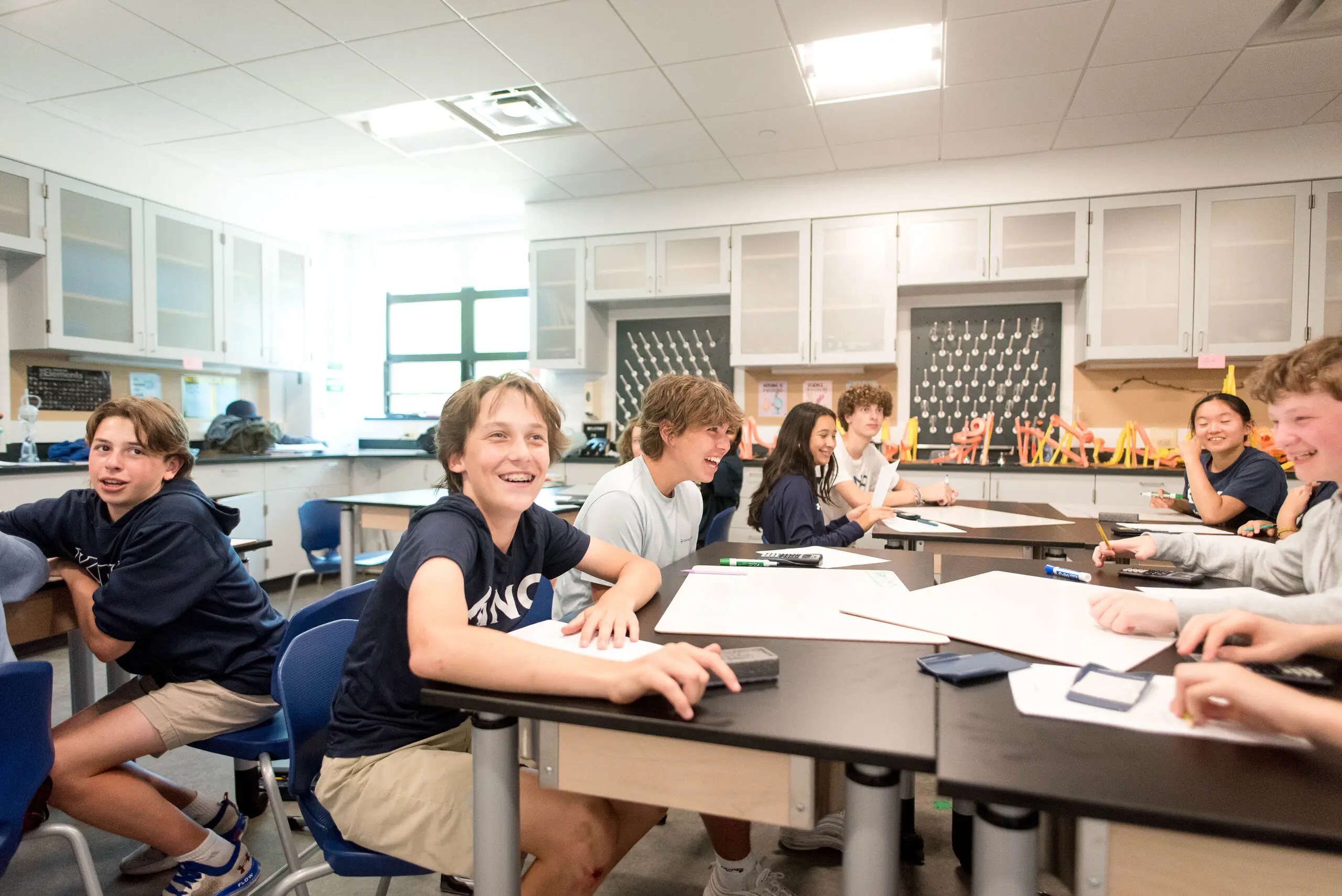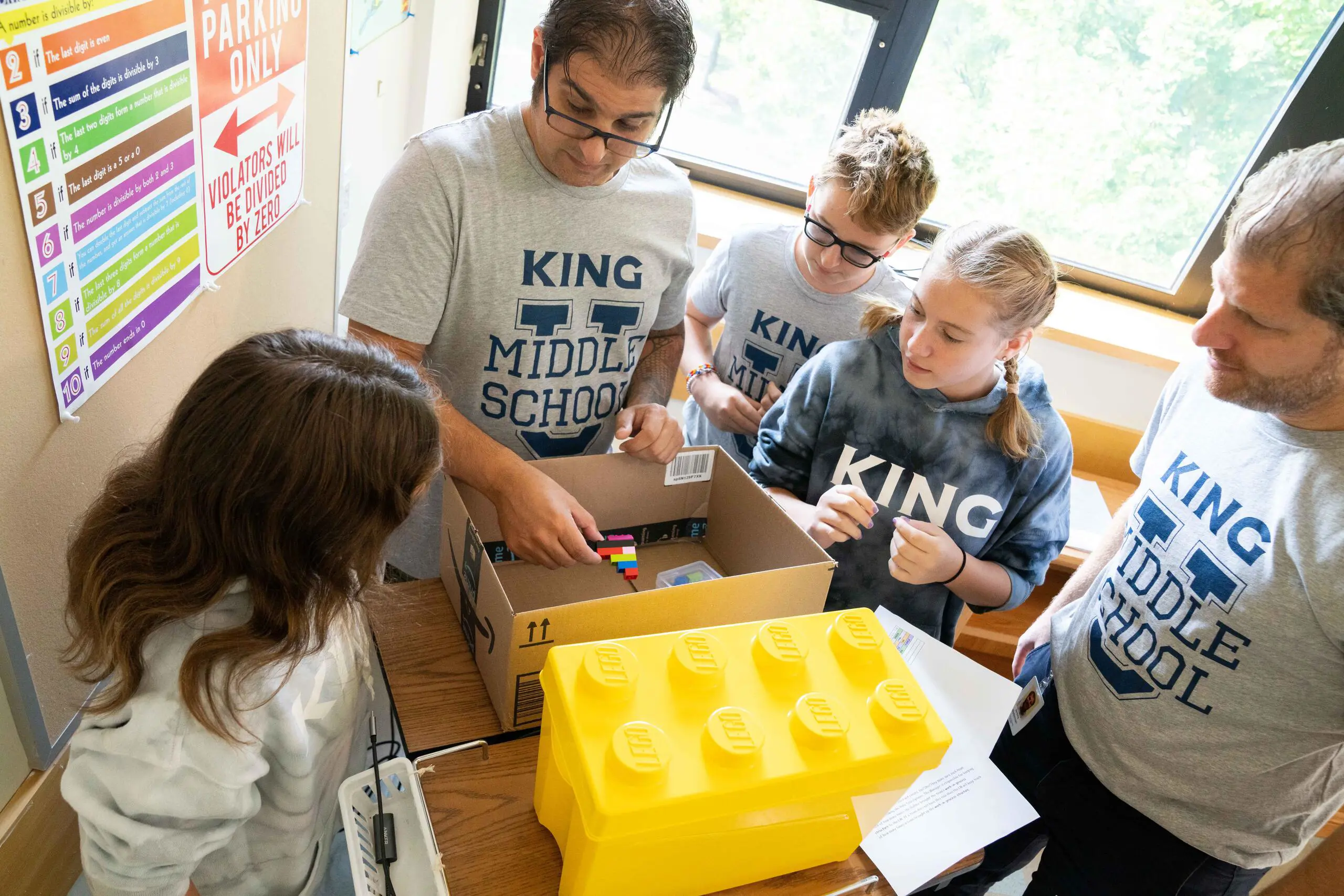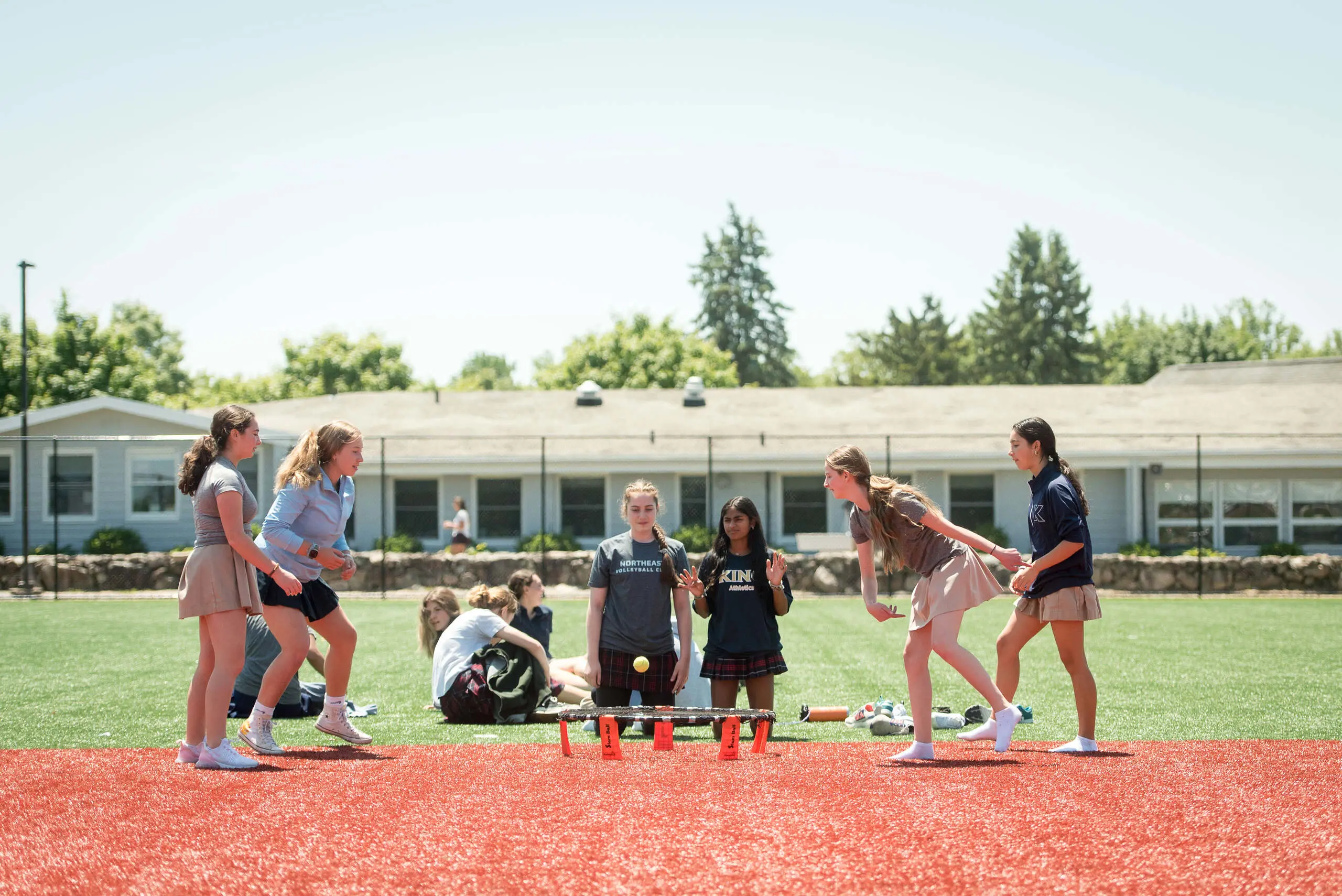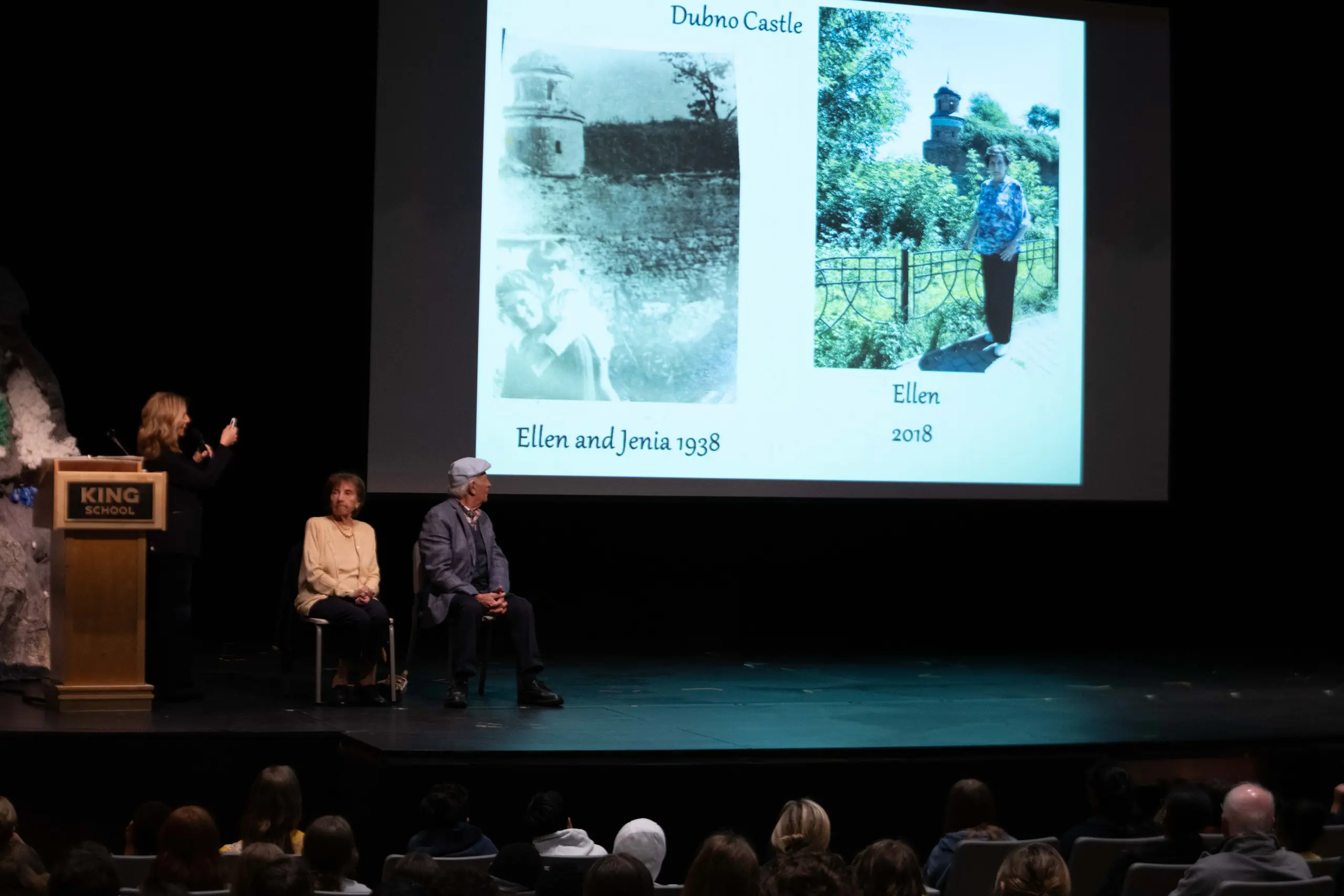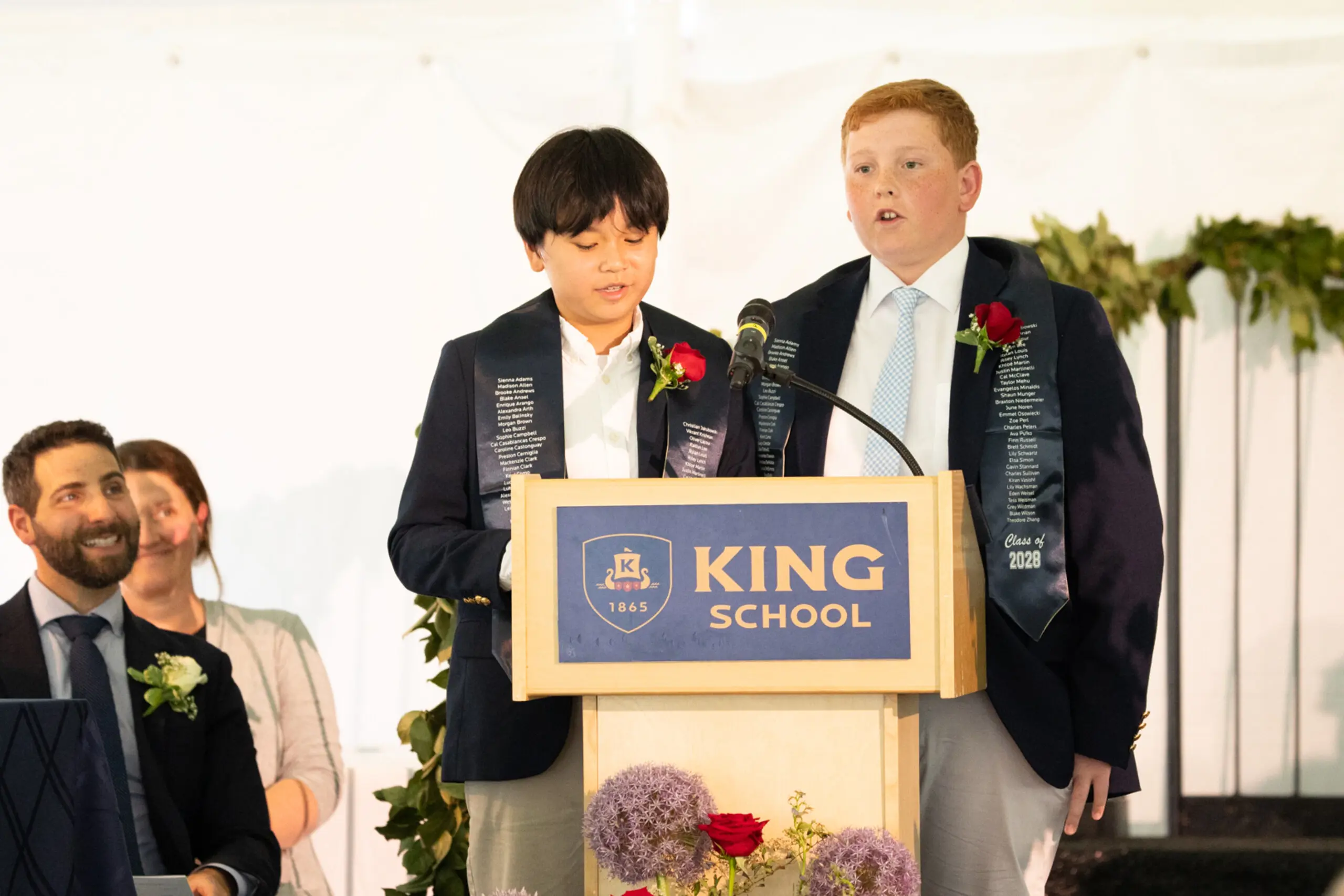Middle School CURRICULUM
The Middle School program provides for continuous academic progress.
This is done through the development of basic learning skills, application of organized information, pursuit of personal interests, and integration of varied subject material.
We have identified communication, intellectual processing, character development, and personal growth as key concepts required for students to pursue lives of learning and accomplishment, personal fulfillment, and social responsibility.
Teachers, Advisors, and Coaches carefully thread elements of these four areas throughout all lessons over the middle school years.
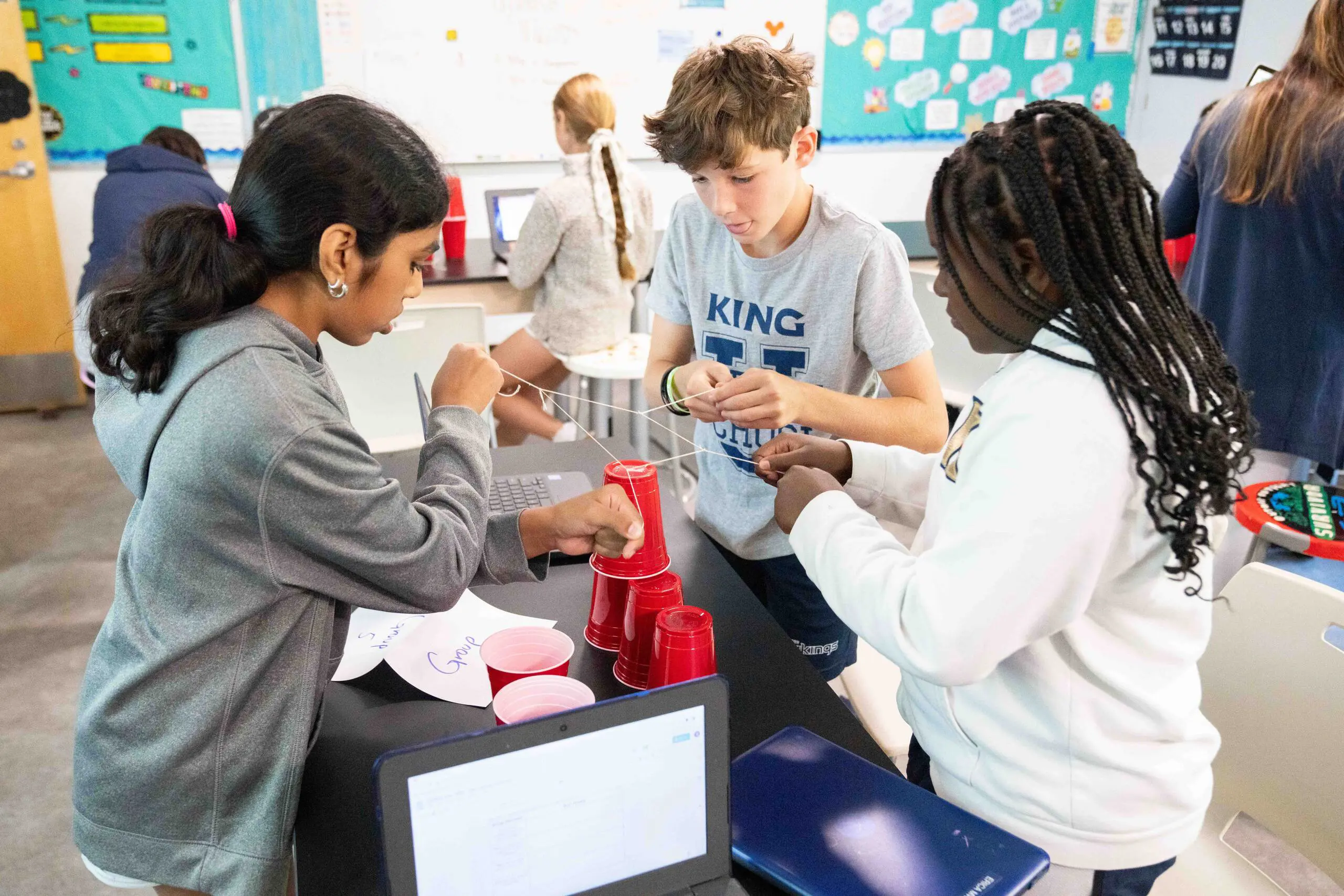
Welcome to the Middle School
Often an entire unit is built around a central question, and subsequent lessons become a student-directed quest for answers. |
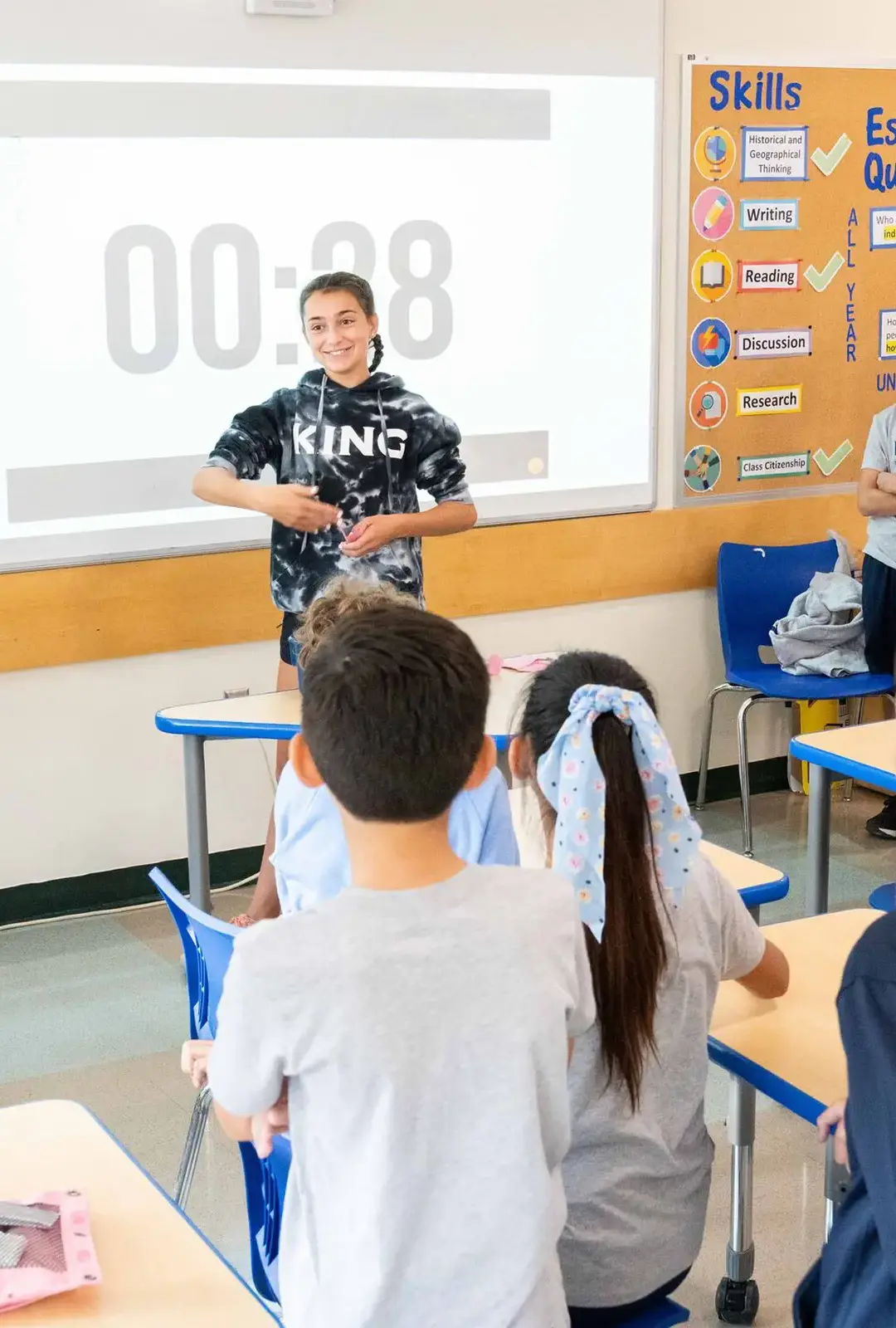 |
Competency Areas for Middle School
Students are self-disciplined so that they:
|
In acquiring these competencies, students are able to recognize their strengths and weaknesses, accept criticism, and identify personal learning styles.
These characteristics enable them to proceed to the next level of intellectual growth. Students recognize that the product is a reflection of the process; by the end of Grade 8, students must realize how to manage the process in order to arrive at a quality product.
As part of the intellectual process, students are able to use technology as a means of expression, communication, and investigation. |
Students make independent interdisciplinary connections and relate their studies to a changing global environment. Students develop competence in, as well as an appreciation of, the value of visual and performing arts and how they relate to other disciplines.
Character Development and Personal Growth
Students have a clear awareness of themselves as individuals and how to support each other; show compassion; accept diversity; and have a sense of community.
By doing so, they develop a sense of moral character. Furthermore, they set standards and act as role models for the entire MS student body. Standards of accountability and responsibility for one’s actions help foster self-esteem.
Students participate regularly in physical activity and learn to value its role in maintaining a healthy lifestyle. In addition, they learn the value of sportsmanship and team play.

Grade Level Program Overview
| Grade 6 |
|---|
|
The Grade 6 program is built around the core essential questions who am I? and who are we? The learning environment exudes an atmosphere of supportive nurturance that takes students to the middle level of their academic, social, and emotional development. Educators are role models who teach overtly through instruction and covertly by personal example. They pattern skills of time management, organization, and the foundation for exercising critical thinking skills. A hands-on methodology and personal interest approach are key ingredients to helping students progress through challenging and complicated coursework and concepts. Generally, development of basic skills through application in content areas is emphasized, rather than a strictly content-oriented “sage on the stage” approach to learning. Teachers are ever-present to provide support, encouragement, and opportunity to capture teachable moments to promote a student’s personal growth and character development. |
| Grade 7 |
|
The Grade 7 program seeks to explore the essential questions of how might others see me?, how might I see others?, and how might I see myself in others? No longer new to the middle school world, students are given greater responsibility and they see an increase in expectations. At the same time, they are surrounded by faculty who have developed a program that ensures success for these adolescents. A continued focus on developing writing, reading, and study skills drives this program. Through grade-sponsored community service, grade-level meetings, and advisory discussions, students are given the tools to show greater empathy for others and to come together as a more unified class that focuses on setting and achieving both individual and collective goals. By the end of the year, students are prepared with the skills and self-confidence necessary for success in the coming years. |
| Grade 8 |
|
The Grade 8 year is dedicated to developing the whole individual as we seek to answer the essential questions: What do I need from my community? And what does my community need from me? Our students have a natural curiosity and enthusiasm for life that is nurtured through exciting programs, educational projects, fun trips, and community service. In the classroom, King presents a diverse and challenging curriculum that emphasizes skill development, high standards of achievement, good study habits, time management, and personal responsibility. It inspires students to pursue deeper levels of understanding, to work cooperatively, and to foster the critical thinking that is so highly valued. The traditional subjects offer a solid foundation for college-preparatory work in the Upper School. Students also are asked to take ownership of their academic growth by participating in student-led conferences, and they receive the encouragement and support of their teachers by assertively advocating for their needs. King presents a challenging and supportive environment for all students to realize their academic potentials. |
Program Designations
Movement between and among our programs is quite fluid and is dependent upon the relative areas of strength for each student.
Students have opportunities for honors placement in Math. Minors: Computer Science/Digital Applications, Choral and/or Instrumental Music, Visual Art, Drama, and Life Skills. Athletics is also part of the required program for all middle school students.
When applicable, we distinguish between the various levels of course offerings in the following ways:
| The College Preparatory Program |
|---|
| The College Preparatory Program is the fundamental program in every given discipline. In some subjects, such as English and History, this standard-level offering is the course that all students take at a particular grade level. |
| The Accelerated Program |
| The accelerated designation exists solely in our Math sequence and seeks to differentiate between the college preparatory and honors offerings to provide an appropriate level of mathematics instruction for all MS students. |
Middle School Course Offerings
Read more about our academic philosophy and view detailed descriptions of all courses. Because of the variety of course offerings available, middle school schedules can vary dramatically from student to student.
Download the Middle School Curriculum Guide
| English |
|---|
|
The English faculty encourages students to explore and understand how language is used to express the thoughts and feelings of English speakers interacting with their world and reflecting upon the challenges of being human. At each grade level students are empowered to develop and refine their skills of reading, writing, thinking, speaking, and listening, as they encounter increasingly challenging texts from a number of literary periods and genres. In particular, the English faculty is committed to developing authenticity of personal voice in each student and to fostering a love of the written word and pleasure in the act of reading.
|
| Math |
|
The Mathematics faculty works to enhance and expand student understanding of pattern, order, relation, and structure, and the development of abilities of logical analysis, deduction, conjecture and proof, and calculation within the context of these patterns and structures. Students learn that the process used in obtaining a solution is at least as important as a correct answer. The faculty also works to ensure that each student is thoroughly familiar with analytical, computational, and problem-solving methods, as well as logical patterns of reasoning.
|
| History |
|
The History faculty guides students in the close examination of the written record of human civilization, human action, and interaction, via primary documents and secondary sources. Research and debate form an integral part of our studies, and special attention is placed on showing the controversy and complexity of historical study as students learn to synthesize and interpret opposing points of view while formulating their own conclusions.
|
| Science |
|
The Science faculty provides a collaborative educational experience in which to study the physical world by reviewing current knowledge, manipulating variables or components, and interpreting phenomena. Students are challenged to expand their knowledge bases and develop the ability to use inquiry, problem recognition and resolution, critical thinking, and research while interacting with technical information. Students are exposed to all three basic sciences to enable them to perceive the world through multiple perspectives, make connections, and see patterns within and between disciplines.
|
| Computer Science |
|
The Middle School program is required for each student, Grades 6-8. Our objective is to introduce all students to the advancing technology that is in the world around them. At each grade level, students are provided with continued exposure to each type of application of digital tools through a variety of hands-on projects. These projects gradually increase from the simplest tasks to ultimately sophisticated, complex work, requiring an ever-expanding level of creativity in finding and applying the most appropriate combination of digital tools to solve the project’s core problem.
|
| World Languages |
|
The World Languages faculty empowers students to understand and appreciate the diverse values, beliefs, biases, and worldviews of non-English speaking people. Students explore linguistic systems through a variety of culturally authentic materials. The faculty employs multimedia resources to expand and refine exposure to the art, literature, and history of the Spanish and French and Chinese-speaking world. Through the acquisition of another language and a more intimate acquaintance with other cultures, students are better equipped to perceive and interpret the world and their place in it.
|
| Performing Arts and Art and Design |
|
At each grade level students complete a number of projects of increasing complexity using a variety of two-dimensional and three- dimensional techniques, including drawing, painting, sculpture, and digital media. Students develop critical thinking skills, are encouraged to take risks, and practice good craftsmanship while building technical proficiency. The elements of art and principles of design are studied through the examination of art history and applied to art making.
|
| Life Skills |
|
The objective of the Lifeskills syllabus is to help students improve decision-making processes. Understanding differing perspectives, clarifying one’s own values, and developing social skills for effective communication are at the core of this course. Topical information is presented in classes which stimulates discussion on the following ideas: understanding self, building teamwork, resolving conflict, respecting difference, understanding human sexuality, and providing service to others. Teachers act as facilitators to present a variety of lessons designed to be informative and allow for personal clarification through the group process. The ultimate goal of this program is to provide students with the factual information and values clarification to help them make more ethical and better (healthier) decisions when confronted with ethical dilemmas at school, out of school, and throughout their lives. This course is non-graded. |
| Athletics |
| Clubs |
|
The Middle School has a tradition of creating various clubs that provide students with an opportunity to explore interests that do not necessarily fall into our core programming. All middle school students have the opportunity participate in clubs. Clubs are both faculty-generated and student-generated. Most clubs are held during our activity period or after school. |
Advising at King
Personal Advisors
The Advisory Program is designed to provide students with support and guidance. Every Middle School student has an Advisor to serve as a mentor and advocate. Although the student and Advisor determine the precise nature and extent of their relationship, the following basic guidelines apply:
- Advisors serve as the primary contact point between home and school and may direct students and/or parents to the appropriate person or information source for questions, special interests, and the resolution of concerns.
- Advisors check regularly with each advisee to discuss academic progress and any other matters that involve the student.
- Advisors facilitate performance conferences in which the student, his/her parents, and the Advisor meet to discuss performance progress and set goals.
- Advisors formally review each advisee’s academic performance, progress towards established goals, and citizenship contributions at the end of each marking period. Their comments are included on the end-of- year report cards.
| Grade Team Leaders |
|---|
|
Each grade is assigned a faculty member who works with the entire class to plan and coordinate activities, programs, and service projects. The primary role of the Grade Team Leader is to encourage the growth and development of each individual class member, to promote teamwork within the class and among the MS grades, and to work with them to develop grade-specific advisory activities and goals. |
| Student Support Team |
|
The Student Support Team (SST) comprises the Head of the Middle School, the Middle School Counselors, the Director of Teaching and Learning, the Dean of Student Life, and the Middle School Coordinator for Diversity, Equity, and Inclusion. This group meets regularly to review programs, student progress and wellness, and parent education. The SST also collaborates closely with advisors and Team Leaders to ensure consistent or programmatic implementation through Advisory and Life Skills curriculum. |
| Dean of Student Life |
|
The Middle School Dean of Student of Life is responsible for contributing to and communicating a focused plan for sustaining student wellness and promoting a positive divisional culture. The Dean also builds strong partnerships with students, families, and faculty, creating a safe, supportive school climate. The Dean oversees the facilitation of course schedules, coordination of advisory activities and themes, and disciplinary matters for each grade. |
| Director of Teaching and Learning |
|
The Director of Teaching and Learning is the division’s primary resource for learning and teaching. As a certified learning specialist, the Director assists and guides students with certain aspects of their studies; coordinates action plans designed to capitalize on student strengths to aid in their academic improvement; and monitors student progress. The Director also teaches Strategy courses. Additionally, the Director functions as a resource for faculty, parents, and students. The Director assists teachers in developing teaching approaches and creating assessments that meet the individual needs of their students, demanding more of those students who are ready for a challenge, and assisting those in need of guidance. Finally, the Director compiles the Cognitive Profile Summaries and helps faculty by pointing out areas of strength in each student’s profile which lead to individual programmatic changes aimed at developing student strengths. |
| Middle School Counselors |
|
The Counselors are responsible for programming to support the social/emotional well-being of middle school students and educational programming in the areas of social issues faced by MS students, as well as counseling of individual students as needed. The School Counselors are available as a supportive resource to all students in Grades 6-8. The Counselors offer the opportunity for brief solution-focused sessions regarding issues that affect students’ academic or social health. If longer-term care is deemed necessary, the Counselors will provide an initial assessment and provide a referral to an outside community resource. The Counselor also takes the opportunity to meet with students new to the Middle School to discuss any issues, which may arise during their transition to a new school environment. Although most students come to the Counselor by their own referral, Administrators, Personal Advisors, and/or parents can also refer students when they feel that some level of intervention is necessary. |

